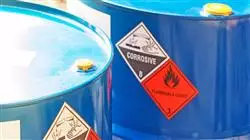University certificate
The world's largest faculty of nursing”
Introduction to the Program
Thanks to this online program, you will be up to date on Emergency Toxicology for Nursing , and you will be able to integrate this current knowledge into your daily clinical practice"

Pesticides, medicines, alcoholic beverages or poisonous plants are just some of the main causes of poisoning for which patients are treated in the emergency department. Their increased use or consumption, as well as the ease with which they can be acquired and consumed, makes this type of situation frequent in emergency department patient care.
Despite the safety measures and warning messages from the manufacturers of the products, poisonings continue to occur, so the nursing professional must be aware of the latest advances in the management of this type of patient, as well as the substances that can cause effects as serious as death. Thus, to offer the latest information and scientific rigor in this area, TECH has designed this Masters Degree, which has brought together medical specialists and police officers knowledgeable about the main substances and situations in which poisoning can occur.
Thus, over the course of 12 months, the professional will be able to deepen, through multimedia resources, the assessment of the intoxicated patient, the management of the intoxicated patient, the latest treatments used, as well as the toxicology produced by the ingestion of drugs, pharmaceuticals or natural products. In addition, students will be provided with simulations of clinical cases that will bring them closer to situations they may face in their daily practice.
The professional is, therefore, before an excellent opportunity to deepen in Toxicology in Emergency through a program in 100% online format, which can be accessed whenever and wherever you want. All you need is an electronic device with an Internet connection to access the virtual platform where the multimedia content of this degree is hosted. A syllabus, moreover, whose teaching load can be distributed according to your interests. An ideal academic option for those professionals seeking to combine a quality Masters Degree with their personal and/or work responsibilities.
A specialized team will take you to learn about the intoxications produced by the latest trends in the consumption of drugs of abuse"
This Masters Degree in Emergency Toxicology for Nursing contains the most complete and up-to-date scientific program on the market. The most important features include:
- The development of practical cases presented by experts in Toxicology
- The graphic, schematic, and practical contents with which they are created, provide scientific and practical information on the disciplines that are essential for professional practice
- Practical exercises where self-assessment can be used to improve learning
- Its special emphasis on innovative methodologies
- Theoretical lessons, questions to the expert, debate forums on controversial topics, and individual reflection assignments
- Content that is accessible from any fixed or portable device with an Internet connection
Check 24 hours a day the multimedia resource library of this program and its most current content on the assessment of the intoxicated patient in the Emergency Department"
The program’s teaching staff includes professionals from the sector who contribute their work experience to this educational program, as well as renowned specialists from leading societies and prestigious universities.
The multimedia content, developed with the latest educational technology, will provide the professional with situated and contextual learning, i.e., a simulated environment that will provide immersive education programmed to learn in real situations.
This program is designed around Problem-Based Learning, whereby the professional must try to solve the different professional practice situations that arise during the academic year. For this purpose, the student will be assisted by an innovative interactive video system created by renowned and experienced experts.
Take the step and access a Masters Degree that you can access comfortably from your computer at any time of the day. Flexibility designed for professionals like you"

Expand your knowledge in Emergency Toxicology for Nursing through this program, where you will find the most comprehensive information on neuropsychiatric disorders in intoxicated patients"
Why study at TECH?
TECH is the world’s largest online university. With an impressive catalog of more than 14,000 university programs available in 11 languages, it is positioned as a leader in employability, with a 99% job placement rate. In addition, it relies on an enormous faculty of more than 6,000 professors of the highest international renown.

Study at the world's largest online university and guarantee your professional success. The future starts at TECH”
The world’s best online university according to FORBES
The prestigious Forbes magazine, specialized in business and finance, has highlighted TECH as “the world's best online university” This is what they have recently stated in an article in their digital edition in which they echo the success story of this institution, “thanks to the academic offer it provides, the selection of its teaching staff, and an innovative learning method aimed at educating the professionals of the future”
A revolutionary study method, a cutting-edge faculty and a practical focus: the key to TECH's success.
The most complete study plans on the university scene
TECH offers the most complete study plans on the university scene, with syllabuses that cover fundamental concepts and, at the same time, the main scientific advances in their specific scientific areas. In addition, these programs are continuously being updated to guarantee students the academic vanguard and the most in-demand professional skills. In this way, the university's qualifications provide its graduates with a significant advantage to propel their careers to success.
TECH offers the most comprehensive and intensive study plans on the current university scene.
A world-class teaching staff
TECH's teaching staff is made up of more than 6,000 professors with the highest international recognition. Professors, researchers and top executives of multinational companies, including Isaiah Covington, performance coach of the Boston Celtics; Magda Romanska, principal investigator at Harvard MetaLAB; Ignacio Wistumba, chairman of the department of translational molecular pathology at MD Anderson Cancer Center; and D.W. Pine, creative director of TIME magazine, among others.
Internationally renowned experts, specialized in different branches of Health, Technology, Communication and Business, form part of the TECH faculty.
A unique learning method
TECH is the first university to use Relearning in all its programs. It is the best online learning methodology, accredited with international teaching quality certifications, provided by prestigious educational agencies. In addition, this disruptive educational model is complemented with the “Case Method”, thereby setting up a unique online teaching strategy. Innovative teaching resources are also implemented, including detailed videos, infographics and interactive summaries.
TECH combines Relearning and the Case Method in all its university programs to guarantee excellent theoretical and practical learning, studying whenever and wherever you want.
The world's largest online university
TECH is the world’s largest online university. We are the largest educational institution, with the best and widest online educational catalog, one hundred percent online and covering the vast majority of areas of knowledge. We offer a large selection of our own degrees and accredited online undergraduate and postgraduate degrees. In total, more than 14,000 university degrees, in eleven different languages, make us the largest educational largest in the world.
TECH has the world's most extensive catalog of academic and official programs, available in more than 11 languages.
Google Premier Partner
The American technology giant has awarded TECH the Google Google Premier Partner badge. This award, which is only available to 3% of the world's companies, highlights the efficient, flexible and tailored experience that this university provides to students. The recognition as a Google Premier Partner not only accredits the maximum rigor, performance and investment in TECH's digital infrastructures, but also places this university as one of the world's leading technology companies.
Google has positioned TECH in the top 3% of the world's most important technology companies by awarding it its Google Premier Partner badge.
The official online university of the NBA
TECH is the official online university of the NBA. Thanks to our agreement with the biggest league in basketball, we offer our students exclusive university programs, as well as a wide variety of educational resources focused on the business of the league and other areas of the sports industry. Each program is made up of a uniquely designed syllabus and features exceptional guest hosts: professionals with a distinguished sports background who will offer their expertise on the most relevant topics.
TECH has been selected by the NBA, the world's top basketball league, as its official online university.
The top-rated university by its students
Students have positioned TECH as the world's top-rated university on the main review websites, with a highest rating of 4.9 out of 5, obtained from more than 1,000 reviews. These results consolidate TECH as the benchmark university institution at an international level, reflecting the excellence and positive impact of its educational model.” reflecting the excellence and positive impact of its educational model.”
TECH is the world’s top-rated university by its students.
Leaders in employability
TECH has managed to become the leading university in employability. 99% of its students obtain jobs in the academic field they have studied, within one year of completing any of the university's programs. A similar number achieve immediate career enhancement. All this thanks to a study methodology that bases its effectiveness on the acquisition of practical skills, which are absolutely necessary for professional development.
99% of TECH graduates find a job within a year of completing their studies.
Master's Degree in Emergency Toxicology for Nursing
The physician's curricular domain should not be limited exclusively to the management of pathologies if they wish to stand out among conventional standards. A broadening of the professional spectrum requires, for example, delving into the interaction of various substances with the organism, since not only viruses are the epicenter of health alterations; risks to physical and mental integrity abound in all social facets. The Master's Degree in Emergency Toxicology developed by TECH Global University is a 100% online educational proposal that aims to meet this need, since there is a lack of academic programs that instruct on such a priority specialty in the workplace. We seek to provide the program graduate with a new highly competitive role, capable of giving a correct anamnesis (elucidating the different harmful components) and preeminent treatment to patients with toxicological syndromes. Because we know that a life at risk requires qualified, comprehensive and experienced care, at TECH we offer you the opportunity to strengthen your skills to meet the challenges that prevail in the workplace.
The importance of toxicological knowledge
The acute changes that the world has experienced due to the pandemic have opened certain gaps at the psychosocial level that volatilize the moods of the population, especially with regard to the youngest. This has precipitated a spiral of debauchery and excesses that compromise health. In Spain, for example, during the Halloween celebrations of 2021, SAMUR-Protección Civil (Municipal Emergency and Rescue Assistance Service) attended 39 minors with alcohol intoxication and one young person with a drug overdose, while in Colombia, during September of the same year, five young people were reportedly admitted to a clinic in the city of Cartagena, intoxicated by a psychoactive substance whose composition was unknown to doctors. Today, more than ever, it is necessary to deepen in the field to know how to proceed in these emergencies. Our program will teach you not only everything you need to know to treat cases of intoxication by psychostimulants and hallucinogens (which are the cases that demand the highest priority) but also by other pharmacological and chemical elements such as heavy metal intoxication, in the latter category. Do you want to enhance your curriculum in an easy and effective way? Take the step to study with us and discover the benefits of belonging to the best online university.







